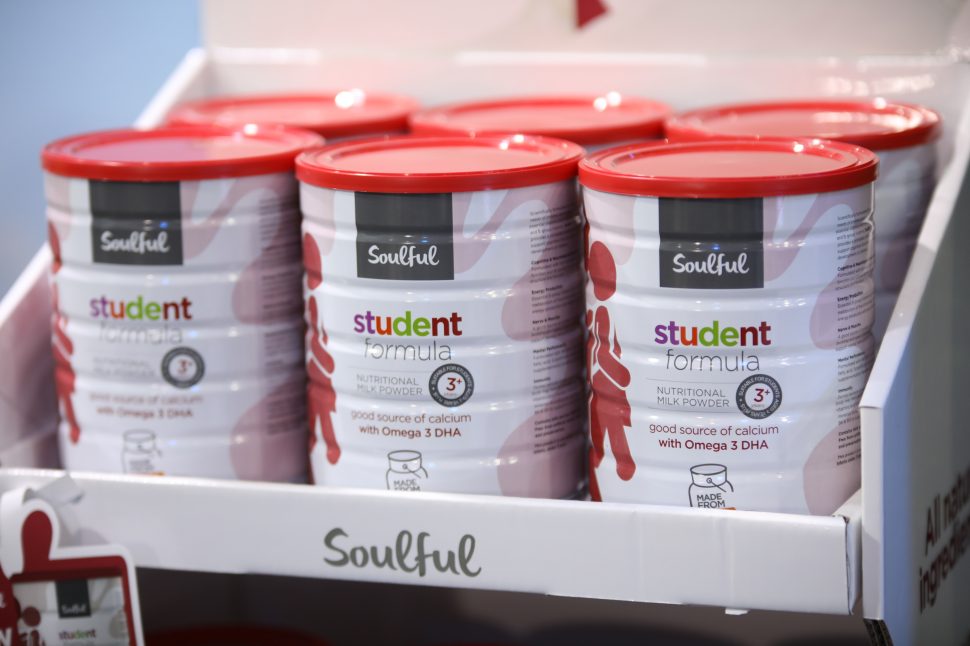5 tips to cut through the Chinese eCommerce market
By 2022, the Chinese eCommerce market will be worth $1.8trillion – more than double the size of the US, according to a recent report by Forrester. Chinese consumers are now amongst the most advanced in the world – and they’re hungry for the unique, natural, quality products Australian brands offer.
According to our recent report Taking on the world, more than a third of Australian small businesses who send parcels overseas are already shipping to China.
So how can other small businesses make the most of this opportunity? Learning from the experience of others is a good start – as these homegrown success stories reveal.

Soulful student formula nutritional milk powder
1. Learn, learn and learn more
“It’s really important to understand your consumer, the market, their buying habits and spending power,” says Aromababy Natural Skincare’s founder Catherine Cervasio. For her, that means visiting the market. “You get a bit of a feel for the culture. Learning a few words of the local language is a way to show respect. I don’t know a lot, but ‘how are you’ and ‘thank you’ can be ice-breakers!”
Sarah Taylor, Founder of Petstock, agrees. “We want to mirror the customer service they would get in store on an online platform. That means learning a new language, and interacting with customers we don’t traditionally see a lot of – so we can understand what they actually want.”
Vitality Brands Worldwide’s Alina Malkin says it’s easy to fall into the mistake of assuming you can take what works for Australia and replicate it in China. “That just doesn’t work. The Chinese market is so big and ever-changing, it’s so different from the Australian domestic market.”
2. Set up the right platforms for your brand
It’s important to protect your core business assets before you set one foot in the market or exhibit at a tradeshow.
“If you’re a small business looking to export into China, first secure all your IP,” says Catherine. She says that includes social media handles – in English and Mandarin.
You won’t reach Chinese consumers through Facebook or Instagram, but you will need a strong presence on WeChat and Weibo. In 2017, 88% of users said WeChat was their most used app – given it integrates communication, eCommerce, payments (WeChat Pay) and service transactions in one app, that’s hardly surprising.
If you want to save time and resources reaching a large number of consumers quickly, it’s also worth setting up shop on an established and credible marketplace platform such as Alibaba’s Tmall. “For us, it’s an enormous saving,” says Frank Granziera, founder of Olive Oil Skin Care Co. “It exposes us to hundreds of millions of subscribers. You could spend hundreds of thousands of dollars trying to get that exposure, but with Tmall it’s all done.”

Chris Szlachetko, founder of health product brand Soulful
3. Engage the right influencers
Building strong relationships with the right Key Opinion Leaders (KOLs) is an important strategy for many Australian brands. “We work with KOLs in China and locally,” says Chris Szlachetko, founder of health product brand Soulful. “We look for Australian KOLs with credibility here, and we make sure the ones we work with in China actually understand and have credibility in our space as well.”
A recognised KOL herself, Catherine says she always looks for new ways to engage influencers. “We do have a lot of celebrity and high-profile people who use the product – for example, we were lucky to get some Aromababy products to Prince Harry and Meghan during the recent royal visit. Leverage any opportunity you can and use it wisely, it doesn’t always need to be paid.”
4. Tell an authentic story
Australian brands perform very well in China – they currently rank third on Tmall according to Helen Sawczak, National Chief Executive Officer at Australia China Business Council.
“One thing that we’re really keen to help and support is to tell your authentic story,” she says. “Don’t try to tweak it to what you think the Chinese want to hear.”
For example, Frank says he regularly posts photographs of his Olive Oil Skin Care products being made, showcasing the authenticity of their origin.
5. Choose the right partners
The Chinese market is certainly challenging to navigate – especially for a small business with limited resources and experience. So it’s essential to choose the right partners from day one.
Like many Australian brands, Soulful partners with Australia Post. “The Australia Post partnership is really important, because it gives us credibility,” says Chris. “Australia Post’s name is ‘Australian’, and it’s an iconic brand that has a positive effect on us by association.”
And Alina says the relationship has also helped Vitality Brands Worldwide tap into much-needed market expertise. “We’ve been working with Australia Post for the last four years, and the partnership has helped us tremendously.”
Get business stories, ideas and offers in your inbox each month.



